
After nearly 6 months of protest Hong Kong has just experienced its most volatile couple of weeks. The city may no longer see millions of people marching through the streets, not that the police are allowing marches at present, only an occasional rally, but the level of disruption and violence being seen through November has surprised, shocked and saddened many. Yet there still appears to be a broad support for the protesters’ general demands, or perhaps put another way, there is such distrust and contempt for Carrie Lam and her administration that the acceptance of the protesters disruption is the easiest way to send a message to her. She though remains in a bubble, still seemingly not fully comprehending the level of angry, frustration and desperation than many, especially the young, feel. The most recent polling shows her personal popularity at 20.2% and dissatisfaction with the government at 79%. The only surprise here is who are the 20.2% who still remain satisfied with her performance? She has led the city to the brink of chaos, scenes unimaginable at the start of the year are now commonplace.
The recent ramp up in protest violence came after the protest side called for a general strike to disrupt the city following the accidental death of a protester who fell from a carpark block. An early Monday morning confrontation between a number of protesters resulted in a traffic cop drawing his gun and shooting a protester in the stomach which required surgery to remove a kidney and part of this liver. He has thankfully survived but this shooting unleashed waves of violence, destruction and disruption which the riot police countered with ever more tear gas, rubber bullets and arrests. Back in 2014 during the Occupy protests in Hong Kong many said the reason they came out to support the movement was because of the police use of tear gas which “wasn’t the Hong Kong way” yet the past weeks have seen the police shoot over 1,000 canisters in a single day at times. As the tear gas goes one way, they are met with volleys of petrol bombs the other way. A dangerous and now all too common scene on the streets of Hong Kong.
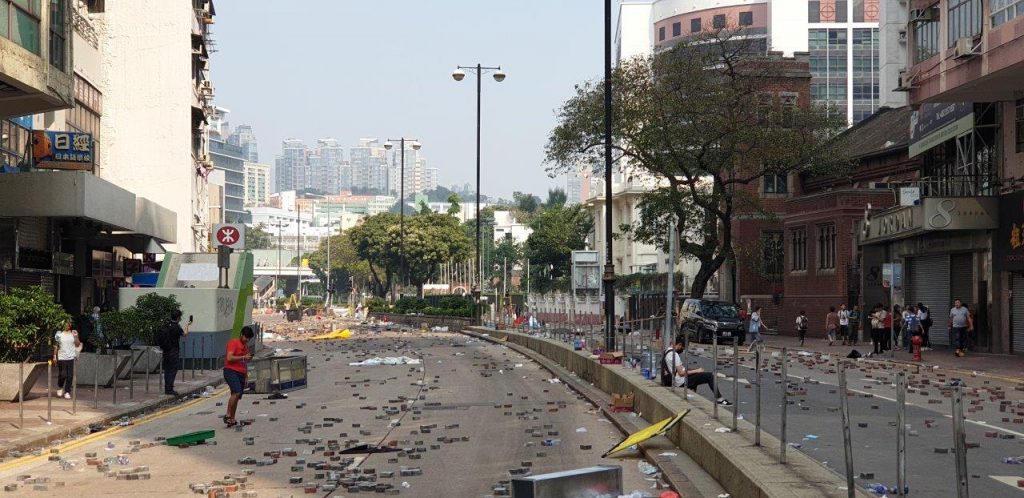
The same day as the shooting, a local man, who had been chasing protesters who had been vandalizing an MTR station, then had a flammable liquid thrown over him and was set alight while arguing with a number of people about the protesters and the protest movement. He suffered significant burns over his arms, face and torso. No one has yet been charged with the attack nor indeed has the police officer who shot the protester earlier in the day been suspended pending investigation. With both incidents recorded on a camera phone the viciousness of the growing number of attacks was plain for all to see. Unarmed protest supporters standing guard at Lennon Walls, which have sprung up across the city, have also been seriously attacked with clubs and knives and while not common, the numerous fights and attacks on those holding different views hardly raises an eyebrow. As one journalist wrote the veneer of civilization is thin even in traditionally safe and calm Hong Kong.
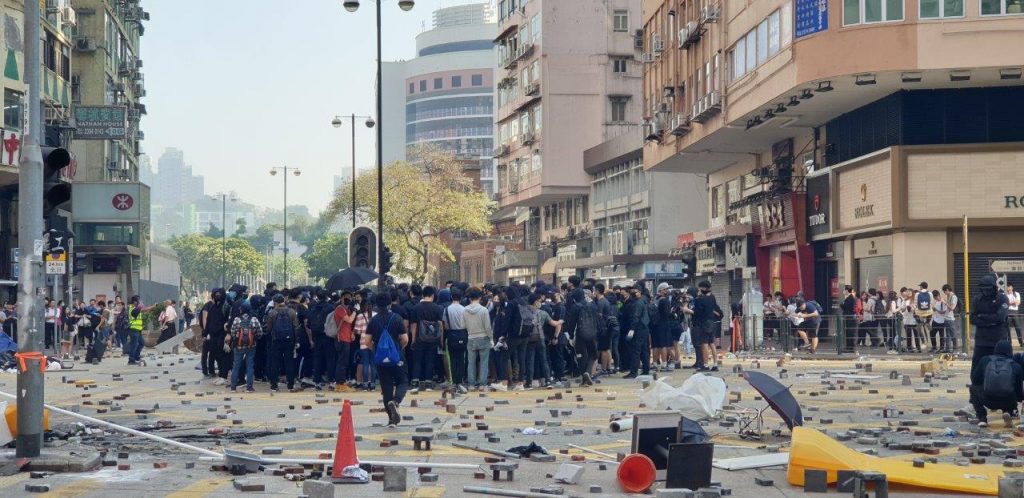
The surreal aspect of the city is how normal life carries on often only a few city blocks away from riots and street battles. That is not to diminish the impact the past 6 months have taken on the city but most people are still working, albeit some from home who have the capacity to do so, weddings are still taking place, even some conferences continue although many others are cancelled. The city had settled into a relatively regular pattern of weekend disruption but reasonably predictable and calm weekdays. That pattern was shattered in the past few weeks as the latest protester shooting resulted in lunchtime “lunch with me” protests bringing office workers onto the streets, often with “geared up” blackshirted radicals. The numbers were only in the few thousands in the business district, but few would have thought that tear gas in Central district’s busy Pedder Street would be seen at lunchtime.
More dramatic was the occupation of Chinese University of Hong Kong and of Hong Kong Polytechnic University by resident students who were joined by other radical protesters both young and old. Both universities straddle key transport links in Kowloon and the New Territories which the students blocked with debris thrown from university linked overpasses. The police tried to storm both campuses but were met with determined protesters armed with bricks, petrol bombs by the thousands, and even bows and arrows. Incredible scenes followed as tear gas rained down on the universities and hundreds, spent the night outside defending their campus as they saw it. The standoff at CUHK and other universities eventually ended after a few days but the PolyU standoff continues at the time of writing, about to enter its second week with a hard core of perhaps 100 protesters refusing to surrender which would result in their arrest for rioting. A lazy narrative developed that the universities were going to be Hong Kong’s June 4 moment and the police would massacre the students. This was never likely, but such narratives took on a life of their own within social media and the cybersphere. For all the tear gas and projectiles no one was killed nor shot during the “sieges” and the bulk of protesters eventually surrendered.
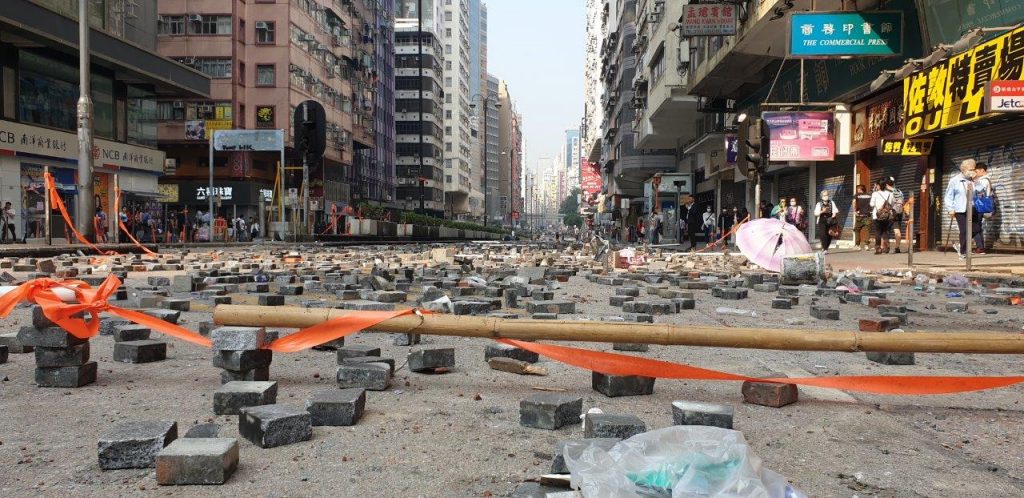
What is most noteworthy of the universities’ standoffs, and is the largest failure to date of the protest movement, was their rejection, deliberate or not, of the guiding principle of the early protests that is, “be water”. The idea of being fluid and mobile, don’t defend territory, hit and run tactics which the police couldn’t respond to in time. These tactics proved highly effective, but in the past week the universities sieges turned that approach on its head and instead became ice. Being water worked well to start but the hit and run tactics failed to produce a long term strategic approach nor did the protest movement seem able to construct a forward looking policy or plan beyond their 5 demands and numerous slogans, which comes across as a rallying cry for independence even though more than 80% of Hongkongers reject independence.
The dramatic scenes which make good TV footage must surely have played a part in the US Congress passing their Hong Kong Human Rights and Democracy Act this week in both the Senate and the House. The Act, which requires President’s Trump signature to become law, will require a yearly review of Hong Kong’s autonomous status to ensure Hong Kong can maintain its privileged position as a separate customs territory from China. The Act further gives Congress sanctions power on individuals within Hong Kong or China who seek to limit that autonomy. That could be refusal of visas for instance for senior Hong Kong government officials. It is no surprise the move angered both Hong Kong and China authorities but whether this Act will have teeth and change the balance in Hong Kong is far from certain. Solutions need to be found locally although overseas involvement and help should not be seen as interference but support and concern for the unique position Hong Kong holds.
The ramp up in violence, for a time, called into question whether the government would hold or postpone Sunday’s district council elections. The elections see 4.13 million registered voters returning 452 council members across all of Hong Kong’s 18 district councils. Hong Kong’s democratic processes are severely limited, and the district council elections are mundane affairs focused on very local issues of public services, transport and playgrounds or the like. But Sunday’s vote is now a test of confidence in the government and in the protest movement. Protest groups have vandalized offices of pro-establishment parties although on social media there is a call that no protests of any kind will occur on Sunday. How Sunday and the results will play out is just not clear. While many lament Carrie Lam’s administration and its uselessness over the past few months there are others who think the chaos and disruption of the protesters has gone too far and that the police should be even tougher to restore calm to the city. The opposition side or Pan-democrats should do well as should a slew of newer younger candidates but even then, the rise in violence on the protest side has also unsettled voters. Guessing at the results is not important, what is important is that all sides respect the results of the vote and draw lessons from it. This vote, coming after such a difficult few weeks, may be a catalyst which can hopefully help pave a way out of the impasse which Hong Kong is in. One section of the population will be denied the vote though. A large portion of those on the streets have been teenagers and indeed the youngest conviction for vandalism is of a 12-year-old but the voting age in Hong Kong is 18. Their voice has been heard on the streets but won’t be in the election booth.
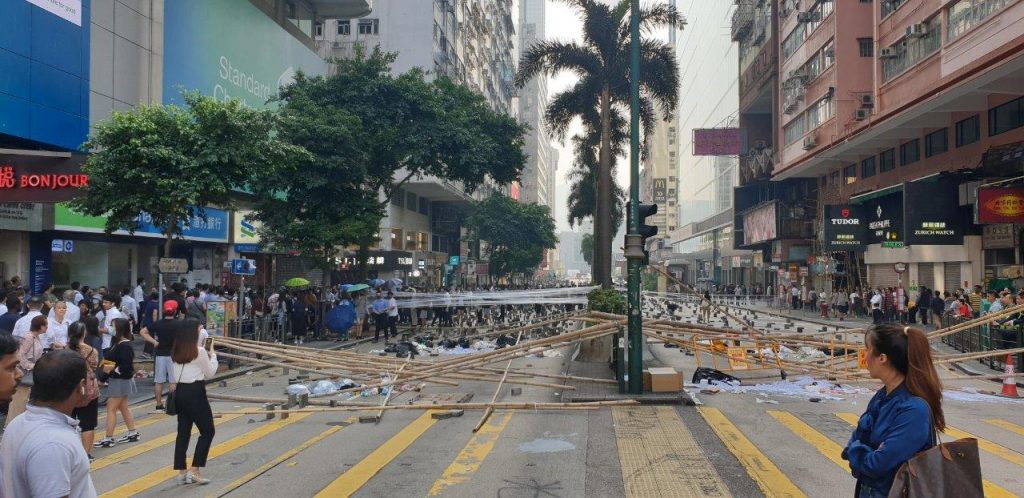
Over the past few months it has been possible to travel to Hong Kong for work or pleasure and hardly notice the effects of the protests. For businesspeople the streets of Central or Admiralty can seem unaffected at times. Black shirts and gas masks aren’t seen nor is a heavy police presence visible. The city is generally quieter than usual but for the infrequent traveler even that may not be noticed. That changed somewhat in the past couple of weeks, but the real and lasting impact of the protest are not the slogans or vandalism or even the traffic disruption. It is what’s happening to individuals, to friends and to families.
As the PolyU standoff continued, only a few hundreds metres away hundreds of protesters blocked road junctions and littered roads with bricks, rubbish, bamboo poles and all manner of debris. The idea being that this would divert police attention from the university and allow some protesters to escape. Speaking with those protesters and local bystanders presented a bleak picture. There was little real hope that such action could work but at least it was something. Something must be done and here was something that they could do. Bricks being scattered from the southbound carriageway to the northbound one in the morning but by the afternoon others were throwing the bricks back from the northbound to the southbound to even out the distribution! No discernable impact and indeed the roads were already well and truly blocked. But locals just wanted to show they could so something. The young are desperate and worried about their future under the ever-harsher China of Xi Jinping.
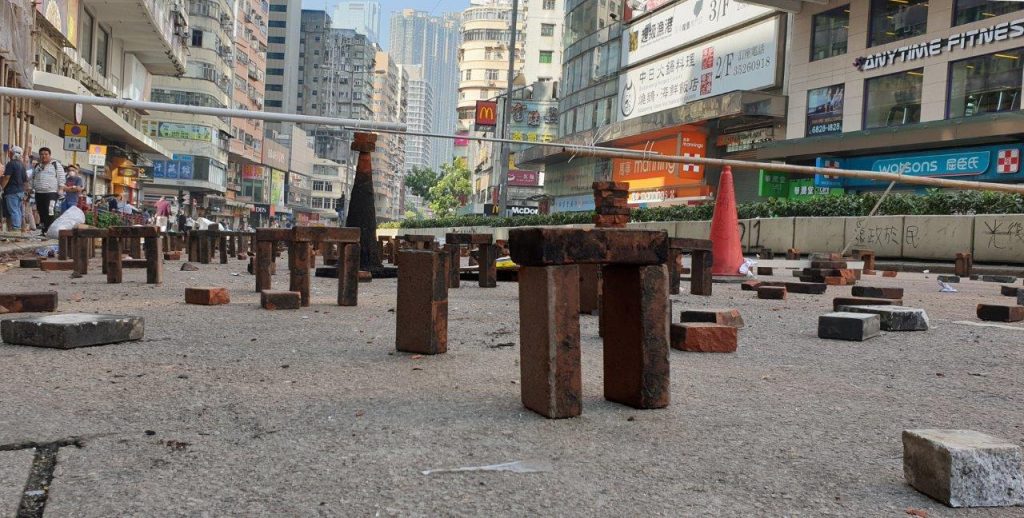
Hong Kong has gone from a high trust society to a low trust society. A place often thought of as apolitical now only has one topic on its mind even though it is easier not to speak about the protests at times for fear of violent arguments between friends, family or colleagues. Depression rates and mental health issues are all up, suicides rates are most likely rising as well. Friendships have been broken over the protests. Rifts between generations are exposed, maybe never to heal, as older residents generally tend to be more pro-establishment and less supportive of the protests. Young people are rightly worried about their future under Chinese rule and even whether they have job prospects left. Students are worried that a Hong Kong university degree will be a liability not an asset with employers. There is a feeling of hopelessness for the present and the future. This is a great tragedy for Hong Kong. A society that has needlessly been torn apart by a Chief Executive and government which has been dumb and blind to widespread anger amongst much of the population.
From a business standpoint Hong Kong can continue to function as a gateway to China and offer a unique role in the financial market development of China but that seems somewhat secondary when the soul of the city and the lives of so many of its residents have been so badly damaged.
カテゴリー
最近の投稿
- 習近平の思惑_その1 「対高市エール投稿」により対中ディールで失点し、習近平に譲歩するトランプ
- 記憶に残る1月
- 高市圧勝、中国の反応とトランプの絶賛に潜む危機
- 戦わずに中国をいなす:米国の戦略転換と台湾の安全保障を巡るジレンマ
- トランプ「習近平との春節電話会談で蜜月演出」し、高市政権誕生にはエール 日本を対中ディールの材料に?
- A January to Remember
- Managing China Without War: The U.S. Strategic Turn and Taiwan’s Security Dilemma
- 「世界の真ん中で咲き誇る高市外交」今やいずこ? 世界が震撼する財政悪化震源地「サナエ・ショック」
- 中国の中央軍事委員会要人失脚は何を物語るのか?
- 個人の人気で裏金議員を復活させ党内派閥を作る解散か? しかし高市政権である限り習近平の日本叩きは続く



